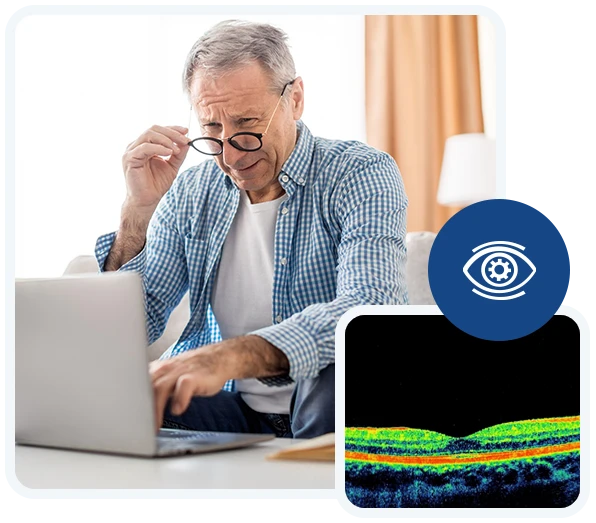Macular Degeneration
Eye Associates of Monmouth
John Ghobrial, MD
Macular Degeneration Prevention
Macular degeneration in America causes more vision loss than cataracts and glaucoma combined. If you’re over 50, age-related macular degeneration (AMD) is a common eye disorder that John Ghobrial, MD, an experienced ophthalmologist at Eye Associates of Monmouth, in Colts Neck, New Jersey, frequently diagnoses and prevents from becoming more severe. If you experience changes in your vision, especially not being able to read up close or see fine details in faces, call to schedule an eye exam or book an appointment online to be tested for macular degeneration.

Macular Degeneration Q & A
Macular degeneration, or age-related macular degeneration (AMD), occurs when the central part of your retina begins to deteriorate. Your retina is the part of your eye that records images to send to your brain through your optic nerve. The most sensitive part of your retina at its center is the macula.
If the macula sends distorted images to your brain, you may have trouble:
- Reading
- Driving a car
- Seeing fine details
- Recognizing faces
- Focusing on a computer or TV screen
As your macula degenerates, you may experience blurry vision or blind spots in the center of your area of focus. Untreated AMD can get progressively worse and lead to permanent blindness.
Aside from your age, other risk factors that may contribute to AMD include:
- Heredity
- Environmental factors, such as the sun’s ultraviolet rays
- Smoking
- Obesity and poor diet
- Smoking
- Cardiovascular disease
There is no single known cause of macular degeneration, but if you have any of the risk factors listed above, you can make some lifestyle changes to prevent the onset of the disease. The most effective way to detect macular degeneration is with regular eye exams and diagnostic testing.
At Eye Associates of Monmouth, Dr. Ghobrial uses the latest technology in fundus photography and optical coherence tomography to diagnose and monitor macular degeneration. With this state-of-the-art equipment, Dr. Ghobrial can determine if you need early treatment for either dry or wet macular degeneration — the two forms of the condition.
Wet, or neovascular macular degeneration, refers to the growth of new blood vessels in the macula. These new blood vessels are weak and often leak fluid and blood into your eye. This form of AMD is less common than dry AMD (non-neovascular) but more often leads to vision loss. Dry AMD is more common and typically the result of aging and a thinning macula.
Not long ago, there was no treatment for wet macular degeneration, but advances in the field of ophthalmology over the last 10 years make it possible to treat both wet and dry macular degeneration with medications and other treatment options, such as injections and laser therapies.
If you have a family history of AMD or you are concerned about recent changes in your vision as you’ve gotten older, call to schedule an eye exam or request a convenient appointment time using the online system.

